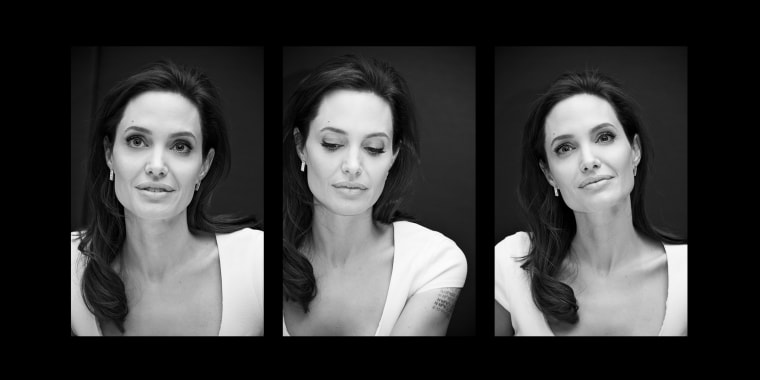Actress and activist Angelina Jolie has written a powerful essay for TIME Magazine in response to United Nations concerns that "gains on gender equality risk being reversed by decades" due to the impact of the coronavirus pandemic on domestic violence and women in the workplace.
"The numbers paint a stark picture of a possible 2 million additional cases of female genital mutilation globally by 2030, 13 million additional child marriages, an additional 15 million women and girls subjected to gender-based violence for every 3 months of lockdown, and a further 47 million women forced into extreme poverty," Jolie, a Special Envoy of the United Nations High Commissioner for Refugees, wrote, calling the possibility of regression "intolerable."
Jolie, who also spoke on a TIME panel about the topic, wrote that while the pandemic might have "inflamed" inequalities, the issues at hand existed long before COVID-19.
"Humans — not disease — are responsible for unjust laws and systems, and racial and social inequality," she wrote, citing shocking statistics about domestic violence in the United States and around the world. "The coronavirus is just the latest excuse for all that we didn’t fix ourselves."
"We live in an era of artificial intelligence and quantum computing," she continued. "Yet the basic rights of women to an education, the vote, control over their bodies, equal protection under the law, equal pay and full representation in society, are still debated in terms that would be familiar to early campaigners for women’s rights, with much of the same old unrepentant misogyny, worn out excuses, and outright violence."
Jolie's essay also highlighted the lack of aid in such serious crises: Less than 1% of all international humanitarian assistance is directed towards sexual and gender-based violence programs, showing a "clear signal that preventing such crimes is not accorded high priority by governments."
Jolie, an outspoken activist and humanitarian, has spent nearly two decades campaigning for human rights around the world. She's been awarded many times for her efforts and founded major organizations, including the Jolie Legal Fellowship, a legal network that sponsors lawyers and attorneys to advocate for human rights development around the world.
While the problems Jolie writes about are international, she argued that it's important that Americans look at their own country and its policies regarding violence against women as the 2020 presidential election approaches.
"This should not be a partisan issue," she wrote. "Yet it has emerged as a dividing line in next month’s Presidential election. The Violence Against Women Act (VAWA) was allowed to lapse in February 2019 and has yet to be reauthorized. Only Joe Biden has committed to the authorization of VAWA in his first 100 days in office and to America leading in the fight against gender-based violence globally."
It's not just domestic policy that matters: Jolie highlighted talks between the United States and Afghanistan, where she opened a school for girls in 2013, as side-lining women in the country.
"...After an invasion we justified in part on the grounds of the Taliban’s treatment of women and two decades of efforts to support Afghan women in their demands for an equal place in society, we have knowingly taken part in a diplomatic process that side-lined Afghan women," she wrote. "America is stewarding a peace agreement that may not even require the Taliban to guarantee the basic right of all Afghan girls to go to school, without exception. Equal rights should mean just that, not equal rights where expedient."
Even if the alarming predictions of progress during the pandemic are averted, Jolie said she believes it will take a reinvention of what we see as the status quo to make sure rights for women are protected.
"At home, we need a far greater focus on safety: The prevention of domestic violence, greatly increased support and services for survivors including children exposed to violence and trauma, and a system that provides accountability," she wrote. "Abroad, we and other powerful countries should acknowledge the blatant inconsistencies in our approach to foreign policy: our willingness to turn a blind eye to human rights abuses when they are committed by allies or partners with whom we want to do business, or when we simply decide that our own political priorities have shifted."
Jolie ended her essay with a call to action for people and governments around the world, asking that they not be as "patient or accepting of compromises" as their predecessors.
"The possibility of a setback in women’s rights globally ought to provoke a tidal wave of anger and concern, and pressure on governments to guarantee that they will not countenance this unjust and dangerous outcome," she wrote. "Continued suppression or reversal of women’s rights would lead to a more insecure and divided world, with greater numbers of refugees and increased conflict. It is as much a threat to our interests as it is an affront to our values. Women shouldn’t be the main voices in this fight. Men must take a stand."


